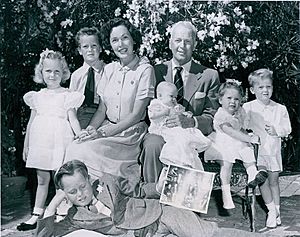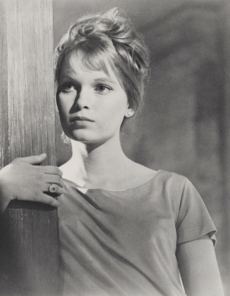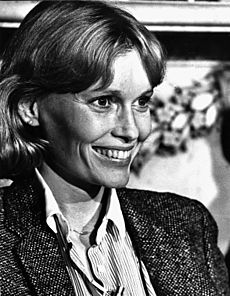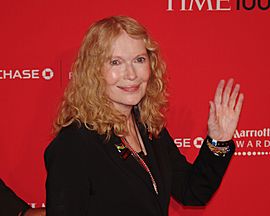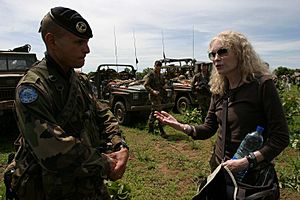Mia Farrow facts for kids
Quick facts for kids
Mia Farrow
|
|
|---|---|
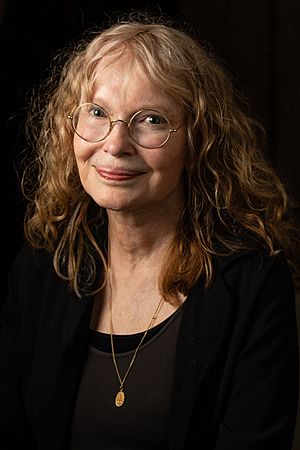
Farrow in 2018
|
|
| Born |
Maria de Lourdes Villiers Farrow
February 9, 1945 Los Angeles, California, U.S.
|
| Occupation |
|
| Years active | 1959–present |
| Political party | Independent |
| Spouse(s) | |
| Partner(s) | Woody Allen (1980–1992) |
| Children | 14, including Soon-Yi, Moses and Ronan |
| Parent(s) | |
| Relatives |
|
| Awards | Full list |
Maria de Lourdes Villiers Farrow, known as Mia Farrow, is an American actress and activist. She was born on February 9, 1945. She first became famous for her role as Allison MacKenzie in the TV show Peyton Place. She became even more well-known after her marriage to the famous singer Frank Sinatra.
One of her most famous early movie roles was in the horror film Rosemary's Baby (1968). This role earned her nominations for a BAFTA Award and a Golden Globe Award. Throughout the 1970s, she starred in popular films like The Great Gatsby (1974) and Death on the Nile (1978).
From 1980 to 1992, Farrow was in a relationship with director Woody Allen and appeared in 13 of his movies. Some of these films include Hannah and Her Sisters (1986) and Alice (1990). Their relationship ended in 1992.
Besides acting, Farrow is known for her work as a UNICEF Goodwill Ambassador. She has done a lot of humanitarian work, especially in African countries like Darfur, Chad, and the Central African Republic. In 2008, Time magazine named her one of the most influential people in the world.
Contents
Early Life and Family
Mia Farrow was born in Los Angeles, California. Her father was Australian film director John Farrow, and her mother was Irish actress Maureen O'Sullivan. She was one of seven children. Farrow grew up in Beverly Hills, California, in a Catholic family. She was known as an imaginative child who liked to put on shows for fun.
When she was nine, Farrow got sick with polio. She had to stay in a special hospital room for three weeks. She later said this experience marked the end of her childhood.
In 1958, her family moved to Spain for her father's work. Later that year, her oldest brother, Michael, died in a plane crash. After this sad event, Farrow and her sister Prudence went to a boarding school in England.
When Farrow was 16, she moved back to the United States. Her father passed away from a heart attack the next year. To help support her family, Farrow began working as a fashion model and started acting in plays.
Acting Career
1963–1969: Early Success
Farrow's acting career began with small roles in movies. Her first credited role was in Guns at Batasi (1964). She became a star in the TV show Peyton Place. She left the show in 1966 after marrying Frank Sinatra.
Her first leading role in a movie was in the horror film Rosemary's Baby (1968). The movie was a huge success and is now considered a classic. Her performance was praised by critics, and she won a Golden Globe Award for New Star of the Year.
After Rosemary's Baby, she starred in other films like Secret Ceremony (1968) and John and Mary (1969), where she acted alongside Dustin Hoffman.
1970–1979: Stage and Film Roles
In the 1970s, Farrow acted in many classic plays in London. She was the first American actress to join the famous Royal Shakespeare Company. She played Joan of Arc in a 1971 production.
She also starred in several movies during this time. These included the horror film See No Evil (1971) and the French comedy Dr. Popaul (1972).
One of her biggest roles was playing Daisy Buchanan in the 1974 film version of The Great Gatsby. The movie was a box office hit. She also played Peter Pan in a TV musical in 1976 and appeared in the mystery film Death on the Nile (1978).
1980–1992: Working with Woody Allen
In the 1980s, Farrow began a long partnership with director Woody Allen. She starred in 13 of his films. Her first movie with him was A Midsummer Night's ... Comedy (1982).
She received praise for her role in Broadway Danny Rose (1984), where she played the girlfriend of a musician. For this role, she gained weight and used a different accent, making her almost unrecognizable.
Other important films with Allen include The Purple Rose of Cairo (1985) and Hannah and Her Sisters (1986). For Hannah and Her Sisters, she earned a nomination for a BAFTA Award.
Her last movie with Allen was Husbands and Wives (1992). The film was released shortly after their relationship ended.
1993–Present: Later Work
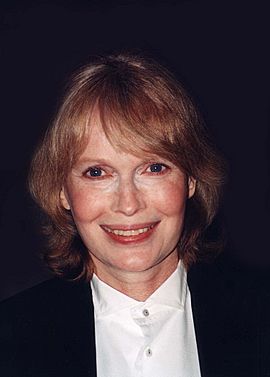
In the 1990s, Farrow worked less to focus on raising her children. She still appeared in films like the Irish movie Widows' Peak (1994) and the comedy Miami Rhapsody (1995). In 1997, she published her autobiography, What Falls Away.
She also acted in TV movies and returned to the Broadway stage. In 1999, she received a Golden Globe nomination for her role in the TV film Forget Me Never.
In 2006, Farrow played a villain in the horror movie remake The Omen. Critics praised her scary performance. She also appeared in the comedy Be Kind Rewind (2008) and provided her voice for the animated Arthur movies.
In 2014, she returned to Broadway in the play Love Letters. More recently, she appeared in the Netflix series The Watcher (2022). In 2024, she starred in the Broadway play The Roommate, which earned her a Tony Award nomination.
Humanitarian Work
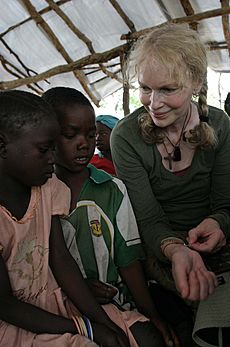
Farrow became a UNICEF Goodwill Ambassador in 2000. She is a strong voice for human rights, especially for children in Africa. She has worked to raise money and awareness for children in areas affected by conflict.
She has traveled to Darfur, a region in Sudan, many times. In 2007, she helped start the Olympic Dream for Darfur campaign. This campaign aimed to bring attention to the problems in Sudan before the 2008 Summer Olympics in Beijing, China.
In 2009, Farrow went on a 12-day fast, drinking only water, to show her support for the people of Darfur. She has also helped create The Darfur Archives, which saves the cultural traditions of the people from that region.
Farrow has received many awards for her humanitarian work. She continues to speak out for people in need around the world.
Personal Life
Marriages and Relationships
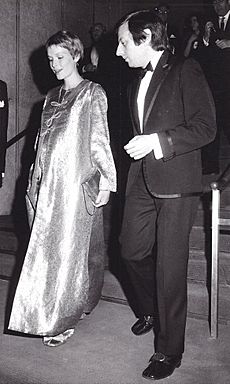
Farrow married singer Frank Sinatra in 1966 when she was 21 and he was 50. They divorced in 1968 but remained friends until he died.
In 1970, she married composer and conductor André Previn. They had three biological sons and adopted three daughters together. They divorced in 1979.
Farrow was in a relationship with director Woody Allen from 1980 to 1992. They had one biological son and adopted two children together. Their relationship ended after it was revealed that Allen was in a relationship with Farrow's adopted daughter, Soon-Yi Previn.
Children
Farrow has fourteen children in total: four biological and ten adopted.
- With André Previn, she had three sons: Matthew, Sascha, and Fletcher. They also adopted three daughters: Lark, Daisy, and Soon-Yi.
- With Woody Allen, she had one son, Ronan Farrow. They also adopted a son, Moses, and a daughter, Dylan.
- After her relationship with Allen, Farrow adopted five more children on her own: Tam, Quincy, Frankie-Minh, Isaiah, and Thaddeus.
Sadly, three of her adopted children have passed away. Lark died in 2008 from a long illness. Tam died in 2000 from heart failure. Thaddeus died in 2016.
Farrow has many grandchildren from both her biological and adopted children.
See also
 In Spanish: Mia Farrow para niños
In Spanish: Mia Farrow para niños
 | Jackie Robinson |
 | Jack Johnson |
 | Althea Gibson |
 | Arthur Ashe |
 | Muhammad Ali |


